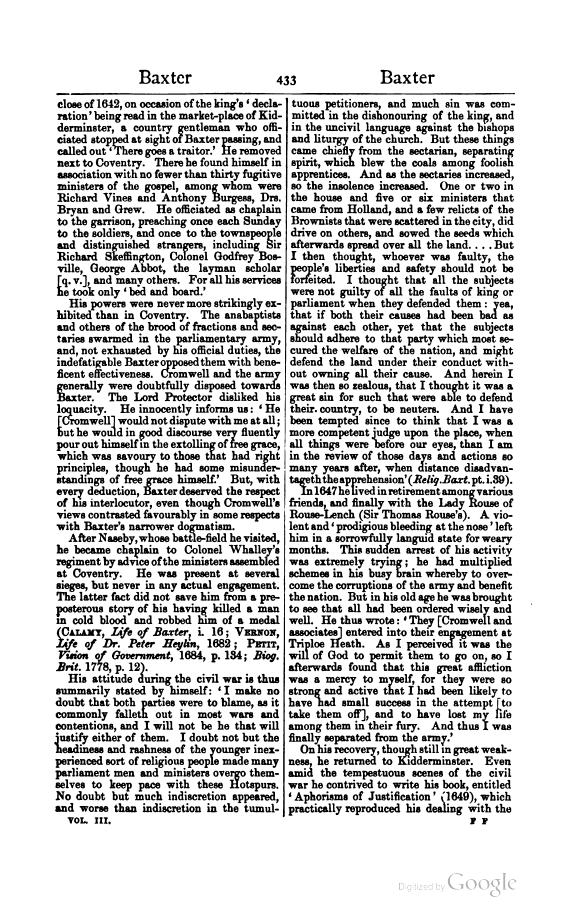close of 1642, on occasion of the king's 'declaration' being read in the market-place of Kidderminster, a country gentleman who officiated stopped at sight of Baxter passing, and called out 'There goes a traitor.' He removed next to Coventry. There he found himself in association with no fewer than thirty fugitive ministers of the gospel, among whom were Richard Vines and Anthony Burgess, Drs. Bryan and Grew. He officiated as chaplain to the garrison, preaching once each Sunday to the soldiers, and once to the townspeople and distinguished strangers, including Sir Richard Skeffington, Colonel Godfrey Bosville, George Abbot, the layman scholar [q. v.], and many others. For all his services he took only 'bed and board.'
His powers were never more strikingly exhibited than in Coventry. The anabaptists and others of the brood of fractions and sectaries swarmed in the parliamentary army, and, not exhausted by his official duties, the indefatigable Baxter opposed them with beneficent effectiveness. Cromwell and the army generally were doubtfully disposed towards Baxter. The Lord Protector disliked his loquacity. He innocently informs us: 'He [Cromwell] would not dispute with me at all; but he would in good discourse very fluently pour out himself in the extolling of free grace, which was savoury to those that had right principles, though he had some misunderstandings of free grace himself.' But, with every deduction, Baxter deserved the respect of his interlocutor, even though Cromwell's views contrasted favourably in some respects with Baxter's narrower dogmatism.
After Naseby, whose battle-field he visited, he became chaplain to Colonel Whalley's regiment by advice of the ministers assembled at Coventry. He was present at several sieges, but never in any actual engagement. The latter fact did not save him from a preposterous story of his having killed a man in cold blood and robbed him of a medal (Calamy, Life of Baxter, i. 16; Vernon, Life of Dr. Peter Heylin, 1682; Petit Vision of Government, 1684, p. 134; Biog. Brit, 1778, p. 12).
His attitude during the civil war is thus summarily stated by himself: 'I make no doubt that both parties were to blame, as it commonly falleth out in most wars and contentions, and I will not be he that will justify either of them. I doubt not but the headiness and rashness of the younger inexperienced sort of religious people made many parliament men and ministers overgo themselves to keep pace with these Hotspurs. No doubt but much indiscretion appeared, and worse than indiscretion in the tumultuous petitioners, and much sin was committed in the dishonouring of the king, and in the uncivil language against the bishops and liturgy of the church. But these things came chiefly from the sectarian, separating spirit, which blew the coals among foolish apprentices. And as the sectaries increased, so the insolence increased. One or two in the house and five or six ministers that came from Holland, and a few relicts of the Brownists that were scattered in the city, did drive on others, and sowed the seeds which afterwards spread over all the land. . . . But I then thought, whoever was faulty, the people's liberties and safety should not be forfeited. I thought that all the subjects were not guilty of all the faults of king or parliament when they defended them: yea, that if both their causes had been bad as I against each other, yet that the subjects should adhere to that party which most secured the welfare of the nation, and might defend the land under their conduct without owning all their cause. And herein I was then so zealous, that I thought it was a great sin for such that were able to defend their country, to be neuters. And I have been tempted since to think that I was a more competent judge upon the place, when all things were before our eyes, than I am in the review of those days and actions so many years after, when distance disadvantageth the apprehension' (Reliq. Baxt. pt. i. 39).
In 1647 he lived in retirement among various friends, and finally with the Lady Rouse of Rouse-Lench (Sir Thomas Rouse's). A violent and 'prodigious bleeding at the nose' left him in a sorrowfully languid state for weary months. This sudden arrest of his activity was extremely trying; he had multiplied schemes in his busy brain whereby to overcome the corruptions of the army and benefit the nation. But in his old age he was brought to see that all had been ordered wisely and well. He thus wrote: 'They [Cromwell and associates] entered into their engagement at Triploe Heath. As I perceived it was the will of God to permit them to go on, so I afterwards found that this great affliction was a mercy to myself, for they were so strong and active that I had been likely to have had small success in the attempt [to take them off], and to have lost my life among them in their fury. And thus I was finally separated from the army.'
On his recovery, though still in great weakness, he returned to Kidderminster. Even amid the tempestuous scenes of the civil war he contrived to write his book, entitled 'Aphorisms of Justification' (1649), which practically reproduced his dealing with the
